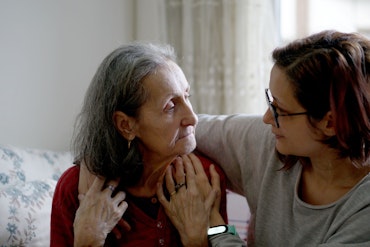Aged care sector prepares for Royal Commission and what it might mean
The Australian aged care sector is about to set sail into uncharted waters following the announcement of a Royal Commission into the industry, and, like much of the wider community, providers, staff and even consumers are wondering what it all might mean.

There will be “three key players” in the pending Royal Commission into aged care (Source: Shutterstock)
A webinar all about the Royal Commission, what it is, what it means and what it is likely to result in was held by peak body for aged care – Leading Age Services Australia (LASA) – to educate and prepare the sector for what lies ahead.
LASA Chief Executive Officer (CEO) Sean Rooney addressed all attendees, highlighting that these are “interesting times” for the industry.
“All of Australia and the industry are appalled and distressed by recent examples shown in the mainstream media of neglect and abuse in the industry,” he explains.
“It’s on us in the industry to do our utmost best to make the aged care system better.”
Mr Rooney says that while the Terms of Reference are still being identified, it is important to remember that the Royal Commission was called to look at quality of care within the system, the extent of any substandard care, young people with disability living in aged care homes, how the system is meeting the needs of people with dementia, and consider the sector’s future needs.
As part of the informative webinar, LASA welcomed Jason Munstermann and Scarlet Reid from McCullough Robertson Lawyers, who explained exactly what a Royal Commission is, how it works, who is involved, what we can expect, as well as how providers can be best prepared to assist.
Ms Reid and Mr Munstermann highlighted that a Royal Commission is different to a court litigation process in that its core focus is to investigate issues set out in the Terms of Reference, with the Commissioner and a team of people assisting with this investigative process which is likely to include behind the scenes interviews, document gathering and public hearings.
They also note that there will be “three key players” in the Royal Commission – including the yet-to-be-announced Commissioner.
“There are three key players in a Royal Commission,” Ms Munstermann explains.
“The Commissioner him/herself – who can also be more than one person – as the chief investigative officer with the key role of making the findings and recommendations set out in the report.
“The Commissioner is assisted in that role by Council Assisting, which is usually a number of experienced barristers, and are supported in the background by an army of lawyers providing briefing materials.
“The third key player is the interested parties.
“They are typically viewed as having information relevant to the process, and identified as having information that is important – whether that be documentary material or witnesses that are of assistance to the Royal Commission in delivering its recommendations and findings.”
Mr Munstermann and Ms Reid go on to explain that there will be preliminary steps, before the Commission will move on to the investigation stage which will see a number of behind the scenes interviews, gathering of information and looking into previous investigations.
They note that after the investigations and hearings, the findings and recommendations, which are the “ultimate end process of the Royal Commission”, will be made.
“These are only recommendations and findings… very different from a court process where parties are bound to the conclusions arrived at by the judge,” Mr Munstermann says.
“This is investigative and though recommendations will be arrived at, it may not necessarily mean they will be adopted.
“The process of then taking the recommendations and putting them into action is a role of Government, where not all recommendations will be implemented by way of legislation or the establishment of a seperate body.
“There will be variances between recommendations and what’s put into place.”
Mr Rooney says there are things we do know about the Royal Commission as it stands, but says there is much that we are “eagerly awaiting”.
“The Terms of Reference will be finalised as soon as practicable, the same as the announcement of the Commissioner, we are looking at around three weeks I would suggest,” Mr Rooney says.
“This is in the hands of others, we need to just see how it plays out, but if three weeks is the case, we could expect the Royal Commission to commence in November.
“The view is that the interim report will then be handed down next year, with a final report most likely produced and received at the end of next calendar year.”
Mr Rooney also highlights that a public portal, ongoing round table meetings, Aged Care Sector Committee meetings, and discussions between Federal and State Governments have all been implemented over the past few weeks to develop the much anticipated Terms of Reference.
Despite all the negativity, Mr Rooney says it is important to remember that it has been reiterated that most providers “do a good job”, and that the Royal Commission will hopefully achieve improvement in the industry going forward.























